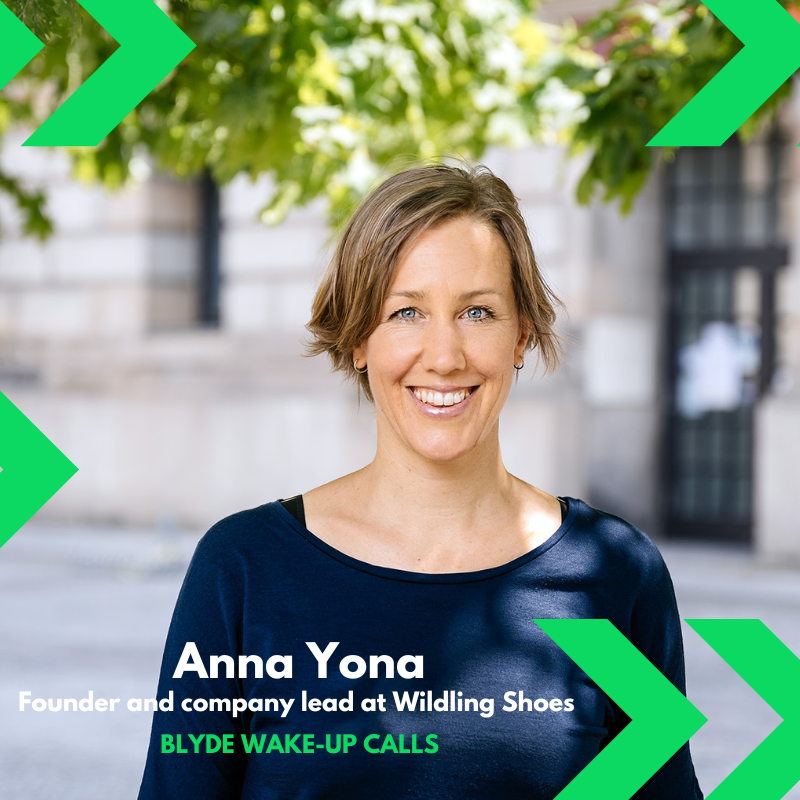BLYDE WAKE-UP CALLS
5 BURNING QUESTIONS TO ANNA YONA, FOUNDER AND COMPANY LEAD AT WILDLING SHOES
The past years have laid bare many truths about our current model of capitalism — the severe income inequality and the belief that improving human lives and taking care of the environment are expendable for better profit margins. The changemakers in the growing Certified B Corporation community are demanding an end to the myth that profits must come at the expense of purpose, and environmental and social care. It’s time to wake up, it’s time for action.
At Blyde we believe in questioning the status quo. We believe in the power of the collective, in taking a stand and inspiring people by showing what can and must be changed. In our weekly Wake Up Calls, Blyde stirs up hunger for positive change. We listen to several B Corp voices who talk about their call to action for companies around the globe today. By letting people from different perspectives and businesses speak, we would like to underline the important role of business in this decade of action. ‘On stage’ today: changemaker Anna Yona, founder and company lead at Wildling Shoes.
What was your wake-up call for contributing to a better world?
I grew up in a household where social justice and ecological mindfulness were quite central issues. As a teenager my wish was to become a Greenpeace activist one day, later I wanted to become a journalist investigating and reporting on social and ecological issues. In the end, everything turned out differently and in a very roundabout, lucky way I got to co-found Wildling.
In the beginning the focus was mainly on getting the product to work and the company to run, on hiring new team members and very much just keeping all the balls in the air. But when it became apparent after two years that Wildling was becoming an economically successful enterprise, we very consciously took a moment to breathe and realign our goals. At that moment we decided that Wildling was not only going to focus on making shoes that could contribute positively to people’s health, but also on HOW we were going to do that. Namely, what kind of positive social and ecological impact we could have by forming meaningful partnerships throughout the product life cycle, in customer engagement, when co-creating a human centered work culture, through the redistribution of money and in collaboration with other brands and organizations in our industry.
Can you share an example of how your company has taken a stand and inspired positive change in your industry or community, and what impact did it have?
Change and transformation are incredibly complex, long-term social dynamics. I believe that it is hard to achieve a meaningful short-term influence and impact, but nevertheless it is crucial to constantly contribute to change and build momentum towards transformation. This can be done by listening to others and making new perspectives heard, by unlearning preconceptions about the world we live in and the systems we have built and by helping others to see a larger picture by speaking up about the deficiencies and injustices one encounters. It is also necessary to collaborate actively with other brands, organizations and individuals and to share knowledge and experience with each other, because the challenges we are facing are much too complex to solve them from one direction only.
Wildling is actively working on creating an environment – within the team and as an actor within society – that fosters change and collaboration. Internally, we have a diversity commitment and are training people to make Wildling a safe space for a diverse team and diverse perspectives. We remain a learning organization, practicing self-reflection and co-creation. Externally, we hook up with other organizations to work together on solutions that can transform the economic system from within. Wildling has co-initiated the Unlearn Business Lab, a platform and method to bring together organizations and individuals to co-create thoroughly new takes on old problems arising from the systems we are all part of.
What are the most important lessons you learned in the past in making a positive impact and how will you apply them today?
There is a fine line between becoming overwhelmed by the complexity of a challenge (and therefore entering a state of paralysis, because the “perfect solution” cannot be found) and aimless activism, just doing something for the sake of doing something, because the status quo is unbearable. It is this fine line that an organization has to walk, in order to take meaningful action. Often intuition and pragmatism are good guideposts to take the first steps, while at the same time one has to remain immensely critical of one’s own actions, allowing new perspectives and experiences to add previously unseen layers of complexity and therefore refining the course of action along every bit of the way, sometimes even abandoning the path completely.
If you could invite one company to join the B Corp community, what company would that be and why?
For me, any company that honestly sets out on the path to becoming a B Corp is a gain. Just going through the assessment can be an eye-opener to identify areas of impact that have not yet received sufficient attention and trigger meaningful change within the organization and for its business conduct. At the same time, there are so many small and medium size organizations out there, doing immensely meaningful work that could truly enrich the B Corp community. One such company is the Nigerian fashion label NKWO that is at the forefront of the sustainable design movement. I am sure they would be a wonderful inspiration for many other brands and organizations in the B Corp network.
Hungry for more stories of changemakers? Read other Wake-up Calls here.
There’s more to come, so stay tuned. Follow us on Instagram!
